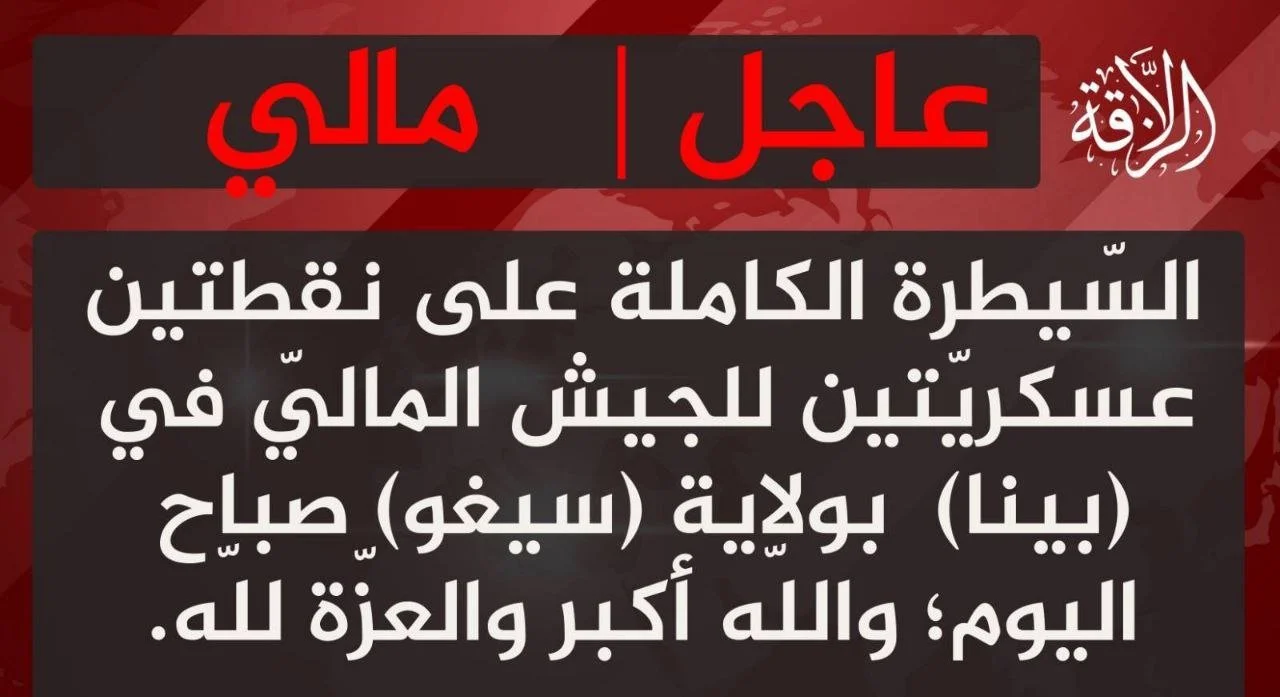JNIM Expands Control in Mali: Al-Qaeda’s Road Rulebook and the Collapse of State Authority
Militant communications are increasingly used to signal territorial control and governance claims amid the collapse of state authority in Mali.
Executive Summary
Al-Qaeda’s Sahel affiliate, Jama’at Nusrat al-Islam wal-Muslimin (JNIM), is transforming Mali’s insecurity into governance by coercion. After months of attacking convoys and blockading fuel imports, JNIM now seeks to enforce social and religious rules on travelers nationwide—including mandatory veiling for women and bans on collaboration with state forces. The group’s imposition of Sharia-inspired road laws marks a shift from insurgency to parallel authority, as Mali’s junta struggles to restore fuel supply and legitimacy amid deepening isolation and the withdrawal of Western counterterrorism partners.
Key Judgments
Key Judgment 1
JNIM is transitioning from a military insurgency to a de facto governing force, imposing its own laws on movement and commerce across southern and western Mali.
Evidence: Following the October 17 destruction of fuel convoys near Sikasso, JNIM announced new travel “regulations” requiring veiling of women and forbidding collaboration with Malian forces. These decrees follow months of road blockades and hostage videos demonstrating the group’s confidence to dictate behavior beyond its bases (Le Matin d’Algérie, RFI).
Key Judgment 2
The ongoing fuel blockade is crippling Mali’s economy and eroding the junta’s public legitimacy.
Evidence: Since September, JNIM has destroyed over 100 tanker trucks and enforced blockades along routes from Senegal and Côte d’Ivoire, causing fuel shortages and 175% price spikes in some regions. Bamako’s power generation, reliant on imported diesel, is now under strain (ABC News, Janes, ISS Africa).
Key Judgment 3
The junta’s negotiations with JNIM have stalled, reflecting both the group’s rising leverage and the regime’s declining control.
Evidence: Talks mediated by local intermediaries have failed as JNIM demands direct, public negotiations and the release of imprisoned fighters. JNIM also seeks to halt crackdowns on informal fuel sales—its key revenue stream—further undermining state authority (RFI).
Key Judgment 4
The blockade forms part of a broader encirclement strategy aimed at isolating Bamako and severing the country’s economic lifelines.
Evidence: Analysts note that attacks on RN1 and RN25—the arteries connecting Bamako to Senegal and Mauritania—mirror tactics JNIM used in central Mali’s Farabougou siege. Control of these corridors enables taxation, recruitment, and coercive governance, echoing al-Qaeda models in Somalia and Yemen (Africa Center for Strategic Studies, ISS Africa).
Key Judgment 5
The Malian military’s reliance on Russian mercenaries has failed to curb JNIM expansion, while human rights abuses have driven new recruitment to jihadist ranks.
Evidence: Since the departure of French and UN forces, Mali’s Africa Corps (formerly Wagner) has been implicated in over 2,000 civilian deaths—more than jihadist attacks over the same period—creating fertile ground for insurgent propaganda and further weakening the junta’s legitimacy (Fox News, Africa Center).
Analysis
JNIM’s latest campaign represents a strategic evolution in jihadist governance. What began as an economic blockade has become a nationwide assertion of authority. By dictating dress codes and adjudicating road disputes, the group is filling the vacuum of a collapsing state, providing both coercion and order. Its decrees now carry the force of law in many rural areas where Malian forces are absent or feared.
The blockade’s effects are cascading. Mali imports nearly all its petroleum products, and the destruction of tankers from Senegal and Côte d’Ivoire has paralyzed logistics. The resulting shortages have triggered soaring fuel prices, electricity disruptions, and a slowdown in mining exports—the junta’s last major source of revenue. In Bamako, citizens queue overnight for fuel, while businesses shut down or turn to the black market. These economic pressures are eroding what little social compact remains between the military rulers and the population.
Negotiations have yielded little. JNIM’s demand for direct talks and prisoner releases underscores its confidence, while the junta’s silence signals weakness. The group’s insistence that women wear veils and that travelers cease collaboration with the army is as much ideological as strategic—it aims to normalize jihadist rule and delegitimize state presence. Local companies such as Diarra Transport, once targeted by JNIM, have begun to comply with its conditions in exchange for safe passage, reflecting a grim pragmatism that further entrenches jihadist influence.
Strategically, JNIM’s encirclement of Bamako mirrors its earlier playbook in central Mali, where blockades preceded political capture. The fall of Farabougou and the ongoing isolation of Kayes and Nioro du Sahel illustrate how the group is methodically severing Mali’s access to foreign trade. Its affiliate, the Macina Liberation Front, now operates across western and southern Mali, bringing 60% of the population within reach of its networks. This territorial expansion threatens not only Mali but also neighboring Senegal, Mauritania, and Côte d’Ivoire—states dependent on stable overland trade.
The junta’s counterstrategy—military escorts and airstrikes—has failed to restore security. Escorting convoys is costly, unsustainable, and vulnerable to ambushes. Moreover, reports of civilian killings by Russian mercenaries have undermined local trust and bolstered JNIM recruitment. Bamako’s diplomatic isolation, following its withdrawal from ECOWAS and the expulsion of UN and French missions, leaves it reliant on a Russian partner whose interests are primarily extractive, not stabilizing.
In the broader Sahel context, Mali’s unraveling signals a regional crisis. The Sahel’s jihadist insurgency has moved from peripheral deserts into vital economic arteries, threatening the stability of coastal West Africa. If Bamako’s paralysis continues, JNIM’s road rulebook could become the de facto law of transit across southern Mali, creating an Islamist corridor from Mauritania to Burkina Faso.
Sources
Le Matin d’Algérie – “Mali: Le JNIM veut imposer ses règles à tous les voyageurs sur les routes”
RFI – “Mali under pressure to end fuel crisis as negotiations with jihadists stall”
Africa Center for Strategic Studies – “JNIM Attacks in Western Mali Reshape Sahel Conflict”
The Guardian – “Sahel-based jihadists are extending their reach. Can a fractured region push back?”
Fox News – “Russian mercenaries replace Western forces as ISIS surges across Africa’s Sahel region”


